Ah, the timeless quote from Bill Clinton about the enigmatic 'is.' A true pièce de résistance in linguistic somersaults! It's like a magical portal into a world where verbs take on a life of their own. Steer through the treacherous waters of semantics, Clinton left everyone scratching their heads in utter disbelief. But hey, if you want to uncover more about this linguistic rollercoaster, buckle up and prepare to delve deeper into the labyrinth of Clinton's word acrobatics. Embrace the journey ahead; it's a wild ride filled with twists and turns you never saw coming!
Background of the Grand Jury Testimony
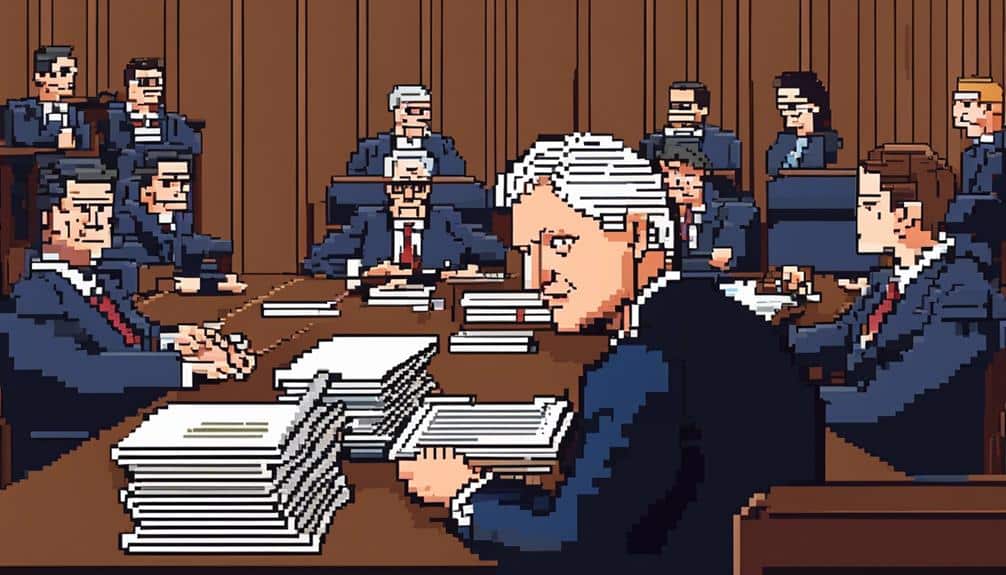
Imagine this: a room filled with serious faces, legal jargon flying around like confetti, and there stands Bill Clinton, the man of the hour, ready to tackle questions like a pro. The year was 1998, and the world held its breath as the President of the United States danced around the infamous question of what the word 'is' truly means.
It was a linguistic masterpiece, a symphony of semantics that left many scratching their heads in confusion. Bill Clinton, the maestro of manipulation, spun a web of words so intricate that even the most seasoned linguists were left in awe. The grand jury sat there, bewildered yet oddly impressed by the linguistic acrobatics on display.
And as a result, a phrase that would go down in history was born: 'It depends upon what the meaning of the word 'is' is.' Oh, the power of language and the lengths one can go to dodge a straightforward question!
Legal Interpretation of 'Is'
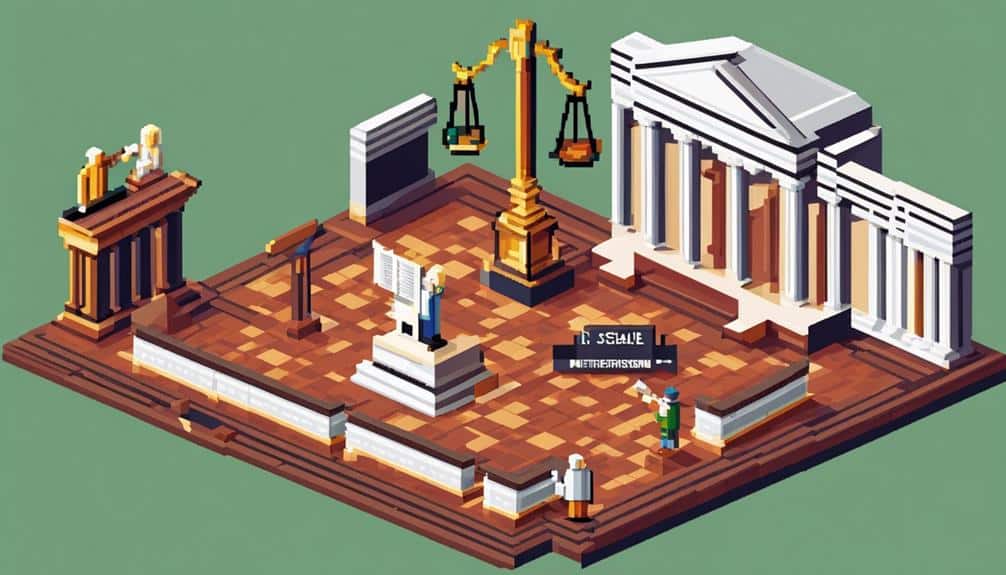
The legal interpretation of the word 'is' in Bill Clinton's grand jury testimony sparked intense debate among scholars and attorneys alike. Imagine the excitement in the courtroom as legal eagles swooped in to dissect the intricacies of this seemingly innocent two-letter word.
Lawyers argued passionately, waving law books in the air, while scholars furrowed their brows in deep contemplation. The crux of the matter boiled down to whether 'is' referred to the present moment or a more ambiguous timeframe. It was as if the fate of the universe hinged on the interpretation of this tiny word.
The courtroom drama unfolded like a Shakespearean play, with each side presenting compelling arguments to support their case. Some claimed that 'is' was as slippery as an eel, capable of shifting meanings at will, while others staunchly defended the word's integrity.
In the end, the legal interpretation of 'is' left everyone scratching their heads, wondering how such a simple word could cause such a stir in the hallowed halls of justice.
Linguistic Analysis of Clinton's Statement

In examining Bill Clinton's statement, a linguistic analysis sheds light on the nuanced use of language that captivated legal minds during the grand jury testimony. Clinton's famous line, 'It depends upon what the meaning of the word 'is' is,' sparked a frenzy of linguistic debate.
The key to understanding this linguistic dance lies in the subtle distinctions Clinton drew between different tenses of the verb 'to be.' By playing with the present tense 'is' and the past tense 'was,' Clinton artfully navigated the question at hand, blurring the lines between truth and interpretation.
This linguistic sleight of hand left many scratching their heads, wondering if the former president was a master of semantics or simply a skilled dodger of direct questions. The strategic parsing of words showcased Clinton's ability to navigate the treacherous waters of legal language with finesse.
Love him or loathe him, one thing's for sure – Clinton's linguistic acrobatics certainly made for a grand performance that won't be forgotten anytime soon.
Public Perception and Political Fallout
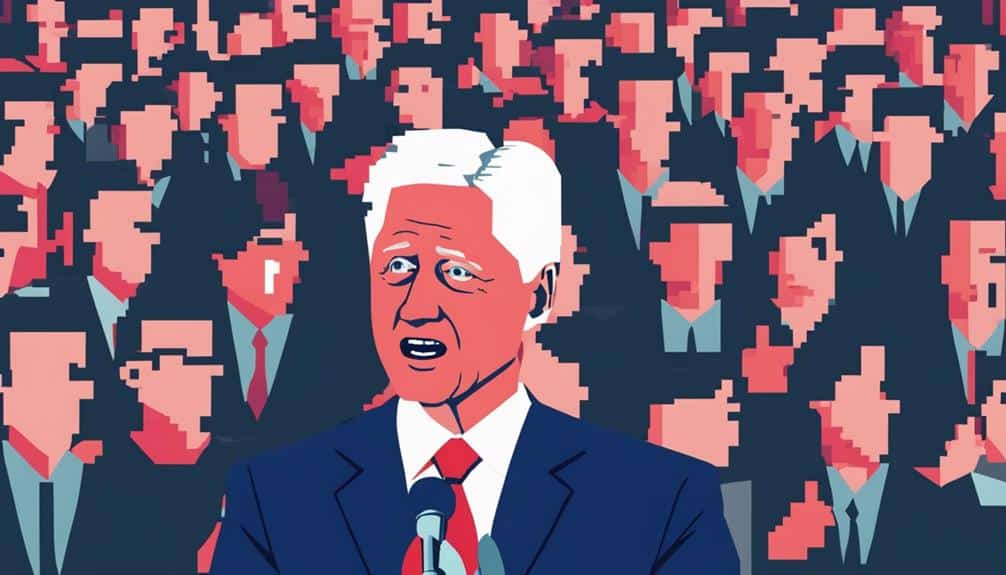
So, you're ready to unpack the media frenzy surrounding Bill Clinton's infamous 'Is' statement and assess the ethical implications it raised.
Get ready to navigate through the maze of interpretations and scrutinize the fallout from a political standpoint.
It's like unraveling a tangled web of words and consequences, all under the scrutinizing eyes of the public and pundits alike.
Media Interpretation Analysis
How did the media's interpretation of Bill Clinton's statement impact public perception and lead to political fallout?
Well, let's immerse ourselves in the whirlpool of media frenzy and see how a simple question about the meaning of 'is' turned into a national spectacle.
The media, like a hungry hawk, delved into Clinton's words, dissecting and analyzing every syllable with the precision of a brain surgeon. They spun stories, creating a web of confusion that even a spider would envy.
Suddenly, the public started questioning their own understanding of basic vocabulary, wondering if 'is' was indeed as straightforward as it seemed.
As the media circus intensified, political fallout was inevitable. Clinton found himself caught in a whirlwind of controversy, with opponents using his 'is' statement as ammunition.
Memes, jokes, and late-night comedy shows all jumped on the bandwagon, turning a linguistic debate into a national punchline.
In the end, the media's interpretation not only shaped public opinion but also left Clinton spinning in a whirlpool of semantics and political turmoil.
Ethical Implications Assessment
Examining the ethical implications of the media's interpretation of Bill Clinton's statement requires a thorough exploration into how public perception was influenced and the resulting political fallout.
When the public heard Clinton's infamous words, 'It depends upon what the meaning of the word 'is' is,' it was like watching a magician pull a rabbit out of a hat – confusing, mesmerizing, and leaving everyone wondering how they got there.
The media frenzy that ensued was akin to a pack of hyenas circling their prey, tearing apart every syllable for the juiciest bit to serve on a silver platter to the masses.
The public, in turn, couldn't help but feast on the scandalous banquet, their opinions swaying like a pendulum in a hurricane.
As the political fallout settled, it was clear that Clinton's linguistic gymnastics had left a lasting mark on his legacy, forever etching a place in the annals of questionable ethics and public relations blunders.
Historical Context and Presidential Authority
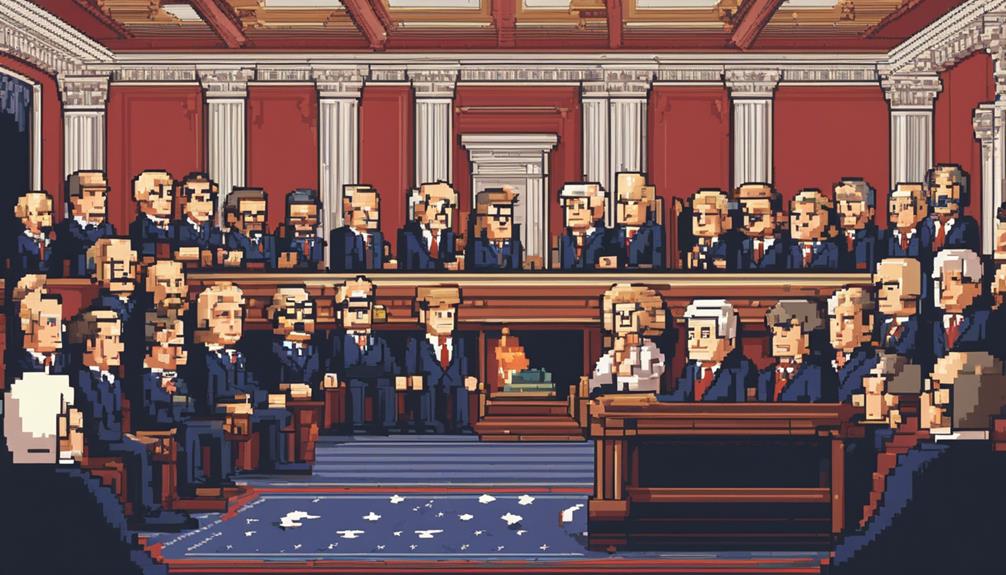
Considering the historical context, presidential authority has been a subject of debate and interpretation throughout American history. It's like being the conductor of a chaotic symphony, trying to balance power and responsibility while dodging the occasional banana peel of scandal.
Here are three amusing instances that showcase the quirks of presidential authority:
- George Washington's Wooden Teeth: Rumor has it, he used his presidential authority to declare wooden teeth the new fashion trend. Talk about using power for personal gain – splinters and all.
- Abraham Lincoln's Hat Collection: Who knew that presidential authority extended to the domain of headwear? Lincoln reportedly used his executive power to decree that top hats were mandatory for all formal occasions. It's like he was saying, 'If the hat fits, wear it!'
- Teddy Roosevelt's Teddy Bears: When your last name becomes synonymous with a fluffy toy, you know you've taken presidential authority to new heights. Roosevelt's love for teddy bears even led to the creation of the iconic toy. Who says you can't bear the weight of office with a cuddly companion?
Media Coverage and Satirical Responses
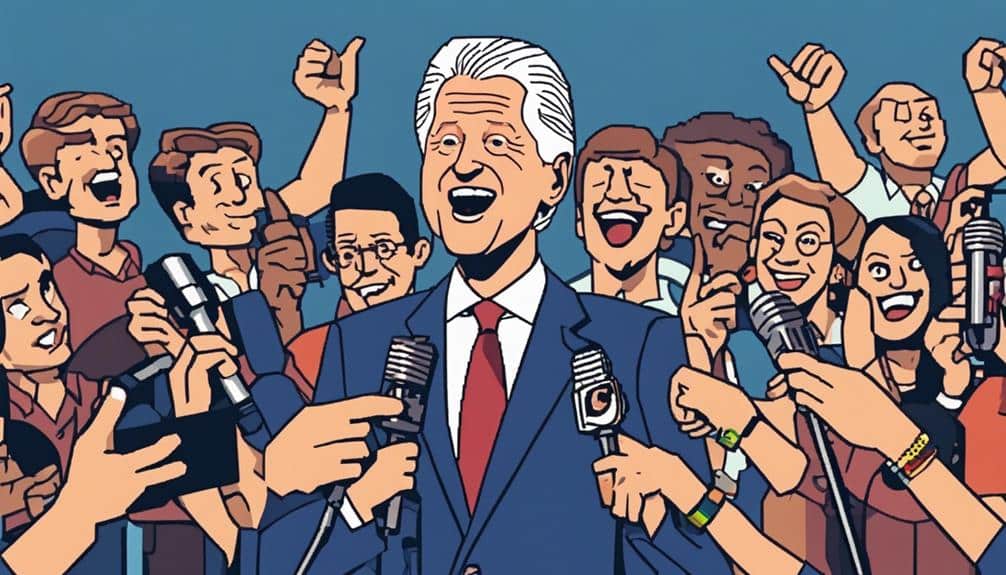
Media coverage often serves as a platform for satirical responses to presidential actions and statements. Bill Clinton's infamous remark about the meaning of the word 'is' sparked a wave of comedic interpretations across various media outlets. Cartoonists had a field day drawing exaggerated versions of Clinton debating the definition of simple words, turning the serious matter into a hilarious spectacle. Late-night talk show hosts seized the opportunity to craft witty monologues poking fun at the linguistic acrobatics employed by the former president. Comedians mimicked Clinton's mannerisms, adding a touch of mockery to their stand-up routines.
Satirical news programs lampooned the situation, creating parody skits where actors portrayed Clinton engaging in absurd wordplay scenarios. Memes flooded social media platforms, with users coming up with clever captions to accompany images of Clinton looking thoughtful.
The public's response showcased the power of humor in highlighting the absurdity of political controversies, turning a complex issue into a source of entertainment and amusement.
Impact on Clinton's Legacy
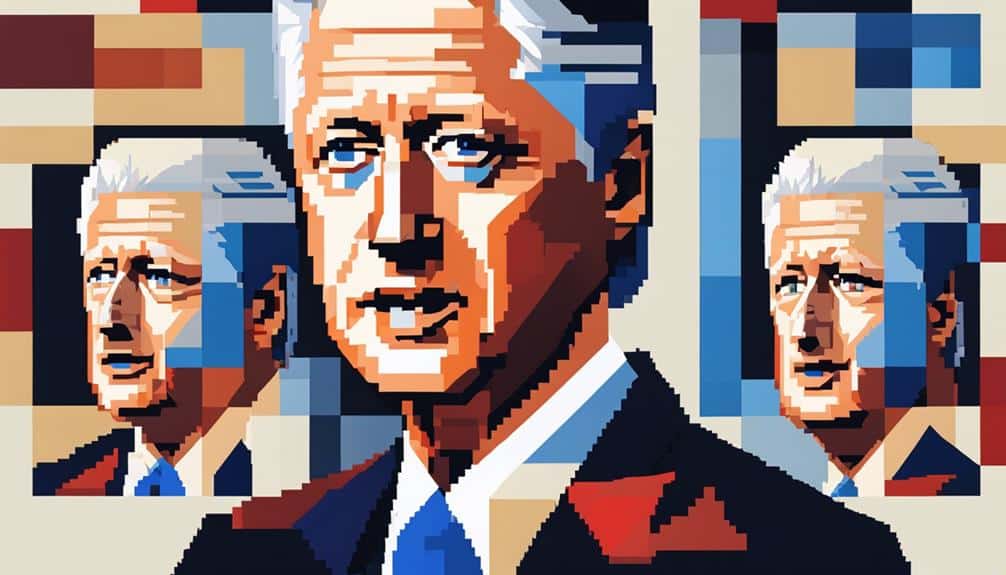
So, you thought you knew all there was to know about Bill Clinton, huh? Well, buckle up because his legacy took a wild ride after that famous 'Is' statement.
From a perceived shift in how history views his presidency to the endless analysis by the media, Clinton's legacy got a major shake-up.
And let's not forget the public opinion rollercoaster that followed – it was like watching a reality show unfold in real-time!
Legacy Perception Shift
The recent revelations have sparked a significant shift in the public perception of Bill Clinton's legacy. Here's why you should care:
- Monica Lewinsky's Dress: A stain on his reputation and a laundry nightmare for the First Lady.
- Impeachment Hearings: Forget reality TV, this was the original political drama that had everyone glued to their screens.
- Legacy vs. Scandal: Can you separate the man from the scandal? It's like trying to separate peanut butter from jelly—it's messy, and you're not quite sure where one ends and the other begins.
With the legacy of the Clinton administration now up for debate, it's like rewatching a classic movie and realizing there were hidden plot twists all along.
Media Coverage Analysis
As you reflect on the recent shift in public perception of Bill Clinton's legacy, consider how the extensive media coverage has shaped this evolving narrative. From scandalous headlines to in-depth analysis, the media circus surrounding Clinton has been nothing short of a rollercoaster ride.
With each news outlet trying to outdo the other in breaking the juiciest story or uncovering the most scandalous detail, it's no surprise the public's view of Clinton has been constantly in flux.
Every news channel seemed to have its own version of the truth, spinning tales that could rival even the most intricate soap operas. The constant bombardment of information, whether accurate or sensationalized, has certainly played a significant role in shaping how people perceive Clinton's legacy.
It's as if the media took a page out of Shakespeare's playbook, turning Clinton's life into a modern tragedy filled with twists and turns that keep audiences hooked.
In this media frenzy, separating fact from fiction has become a Herculean task, leaving us all questioning what we truly know about the man behind the headlines.
Public Opinion Response
Considering the recent shifts in public perception, the impact of public opinion on Bill Clinton's legacy remains a topic of intense scrutiny. The domain of public opinion can be more judgmental than an episode of a reality TV show, with viewers (aka the public) quick to give their verdict on the scandalous plot twists of political figures.
Here's why the public opinion response to Clinton's infamous 'Is' statement matters more than the latest TikTok dance craze:
- Legacy Makeover: Public sentiment can transform a political legacy faster than a social media influencer changes outfits. From hero to zero, a shift in public opinion can redefine how history remembers a leader.
- Media Circus: The public's fascination with scandal and drama can turn a slip of the tongue into headline news faster than you can say 'breaking news alert.'
- Popularity Contest: In the domain of politics, popularity isn't just a high school concern; it can determine the lasting impact and influence of a leader long after they've left the political stage.
Lessons in Communication and Semantics

Understanding the nuances of communication and semantics can greatly enhance your ability to convey ideas effectively. Imagine you're in a conversation where someone says, 'I'll get back to you soon.' How soon is 'soon' really? Is it hours, days, or a vague concept of time that keeps you waiting indefinitely? This is where semantics come into play, dissecting the hidden meanings behind seemingly simple words.
Communication isn't just about the words you use; it's about how you use them. A slight change in tone can completely alter the message you're trying to send. For instance, saying 'That's fine' with a smile versus a frown can convey approval or discontent, respectively. It's like a linguistic dance where every step matters.
Conclusion
To wrap things up, when it comes to defining the word 'is,' just remember that it all depends on who's asking and what the situation calls for. It's like a linguistic game of hide and seek, where the rules are constantly changing.
Just ask Bill Clinton, he's got it down to an art form. Just make sure you have a good lawyer on speed dial if you ever find yourself in a sticky semantic situation.
